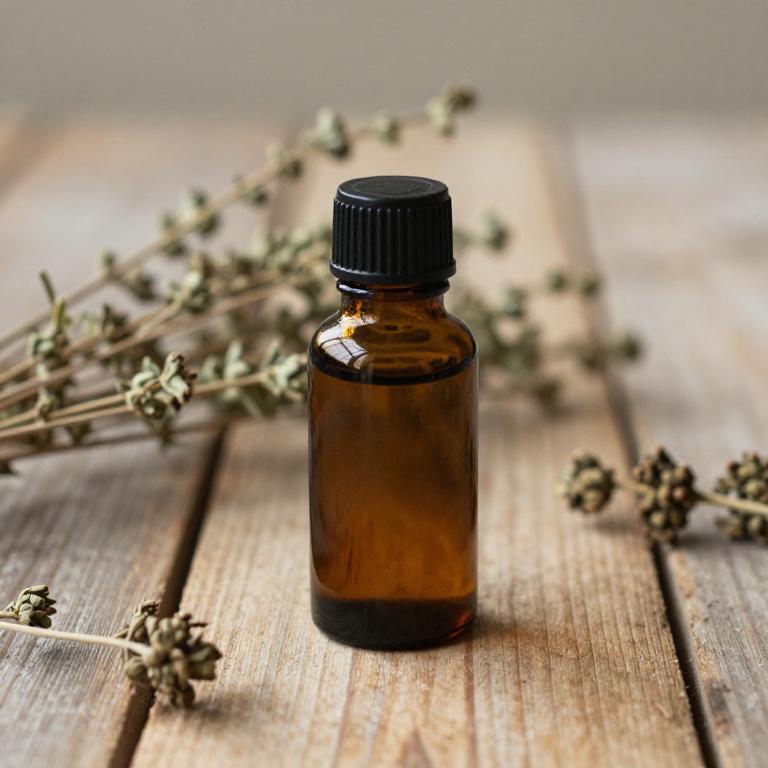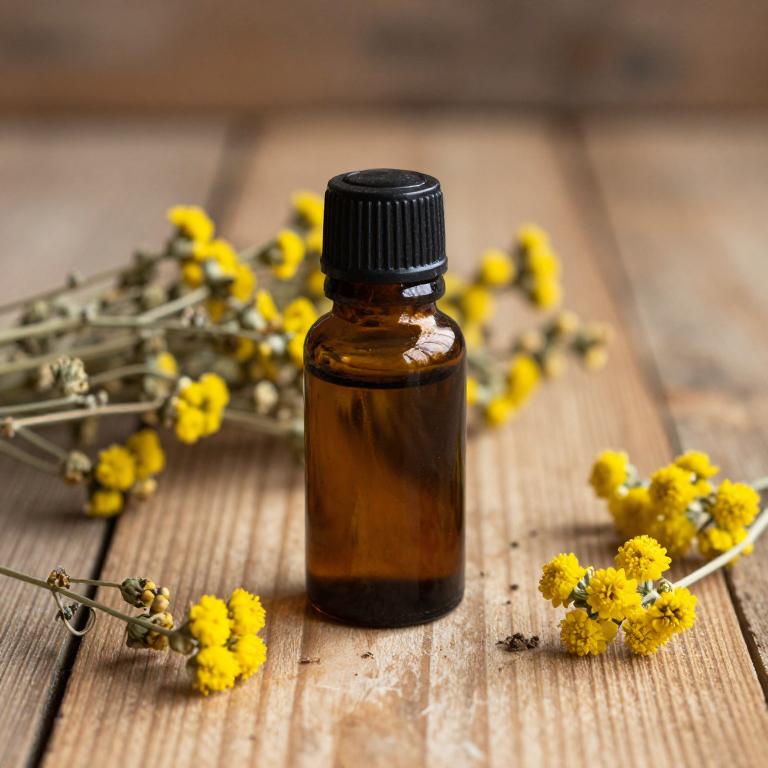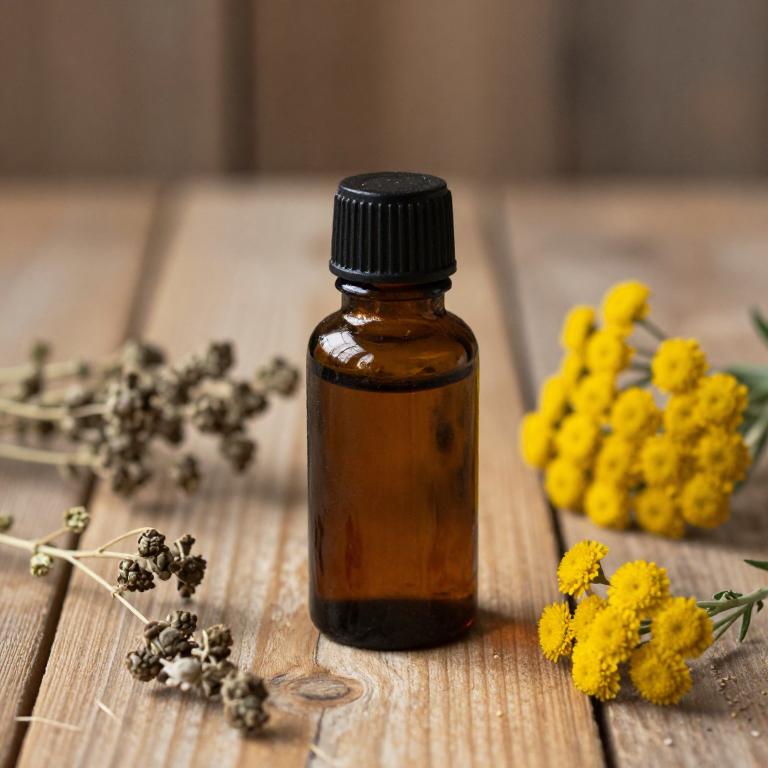10 Best Herbal Essential Oils For Inflamed Mouth

Herbal essential oils, such as tea tree, peppermint, and chamomile, are commonly used to soothe inflamed mouths due to their antimicrobial and anti-inflammatory properties.
These oils can help reduce pain, swelling, and infection in oral tissues, making them a natural alternative to conventional treatments. However, they should always be diluted with a carrier oil to prevent irritation or burns, as pure essential oils are highly concentrated. When applied topically or used in a mouth rinse, they can provide relief for conditions like canker sores or gum inflammation.
It is important to consult a healthcare professional before using essential oils, especially if you have underlying health conditions or are pregnant.
Table of Contents
- 1. Oregano (Origanum vulgare)
- 2. Salvia (Salvia officinalis)
- 3. Thyme (Thymus vulgaris)
- 4. English lavender (Lavandula angustifolia)
- 5. Ceylon cinnamon (Cinnamomum zeylanicum)
- 6. Lemon balm (Melissa officinalis)
- 7. Eucalyptus (Eucalyptus globulus)
- 8. Rosemary (Rosmarinus officinalis)
- 9. Yarrow (Achillea millefolium)
- 10. Melaleuca (Melaleuca alternifolia)
1. Oregano (Origanum vulgare)

Oreganum vulgare, commonly known as oregano, is a potent herb whose essential oil has been traditionally used for its anti-inflammatory and antimicrobial properties.
The essential oil of oregano contains high concentrations of carvacrol and thymol, which are known to reduce inflammation and inhibit the growth of harmful bacteria in the mouth. When applied topically, it can help soothe inflamed gums and reduce pain associated with oral infections. However, due to its strong potency, it should be diluted with a carrier oil before use to prevent skin irritation.
While it shows promise as a natural remedy for inflamed mouth conditions, it is advisable to consult a healthcare professional before incorporating it into a treatment regimen.
2. Salvia (Salvia officinalis)

Salvia officinalis, commonly known as sage, is a herb widely used in traditional medicine for its therapeutic properties, including its potential benefits for inflamed mouths.
The essential oils derived from sage contain compounds like thujone and cineole, which have anti-inflammatory and antimicrobial effects. These properties may help reduce swelling, irritation, and infection in oral tissues. When used in diluted form, sage essential oil can be applied topically to the gums or diluted in a carrier oil to soothe inflammation.
However, due to its potency, it should be used with caution and under the guidance of a healthcare professional to avoid adverse reactions.
3. Thyme (Thymus vulgaris)

Thymus vulgaris, commonly known as common thyme, is a potent herb that contains essential oils with strong antimicrobial and anti-inflammatory properties.
These essential oils, rich in compounds like thymol and carvacrol, are often used in natural remedies for inflamed mouths due to their ability to reduce bacterial growth and soothe irritated tissues. When diluted properly, thyme essential oil can be applied topically to the mouth area to alleviate symptoms of canker sores, gingivitis, or other oral infections. However, it is important to use caution and avoid ingesting the oil, as it can be toxic when consumed.
Overall, thymus vulgaris essential oils offer a natural and effective option for supporting oral health and reducing inflammation in the mouth.
4. English lavender (Lavandula angustifolia)

Lavandula angustifolia, commonly known as English lavender, is widely recognized for its calming and anti-inflammatory properties, making its essential oil a valuable remedy for inflamed mouths.
The essential oil contains compounds like linalool and lavandins, which possess antimicrobial and soothing effects that can help reduce redness and irritation. When diluted properly, lavender essential oil can be applied topically to the affected area to alleviate discomfort and promote healing. Its mild scent also has a calming effect, which can help reduce stress-related mouth inflammation.
However, it is important to consult a healthcare professional before use, especially for children or individuals with sensitive skin.
5. Ceylon cinnamon (Cinnamomum zeylanicum)

Cinnamomum zeylanicum, commonly known as cinnamon, produces a rich essential oil that has been traditionally used for its anti-inflammatory and antimicrobial properties.
When applied to an inflamed mouth, cinnamon essential oil can help reduce swelling and discomfort due to its high concentration of cinnamaldehyde, which possesses potent anti-inflammatory effects. However, it is important to dilute the oil with a carrier oil to prevent irritation, as undiluted essential oils can be too harsh for sensitive oral tissues. This natural remedy may also help combat bacterial infections that contribute to mouth inflammation, making it a valuable option in holistic dental care.
Despite its benefits, individuals should consult a healthcare professional before using cinnamon oil, especially if they have existing oral conditions or allergies.
6. Lemon balm (Melissa officinalis)

Melissa officinalis, commonly known as lemon balm, is a versatile herb that contains essential oils with anti-inflammatory and calming properties, making it beneficial for soothing an inflamed mouth.
The essential oils derived from Melissa officinalis, particularly those rich in compounds like linalool and citral, can help reduce swelling and irritation in the oral cavity. When used in diluted form, these oils may provide relief from conditions such as canker sores, gum inflammation, or mouth ulcers. They can be incorporated into mouth rinses or applied topically with a carrier oil to minimize potential irritation.
Overall, Melissa officinalis essential oils offer a natural and gentle option for addressing inflammation in the mouth.
7. Eucalyptus (Eucalyptus globulus)

Eucalyptus globulus, commonly known as blue gum eucalyptus, is a popular source of essential oil used for its anti-inflammatory and antimicrobial properties.
When applied topically to an inflamed mouth, the essential oil can help reduce swelling and soothe irritation due to its active compounds like cineole and limonene. However, it is important to dilute the oil with a carrier oil before use to prevent skin irritation or chemical burns. This essential oil may also help combat oral bacteria that contribute to inflammation and infection.
As with any herbal remedy, it is advisable to consult a healthcare professional before using eucalyptus globulus oil for oral health issues.
8. Rosemary (Rosmarinus officinalis)

Rosmarinus officinalis, commonly known as rosemary, produces an essential oil that has been traditionally used for its anti-inflammatory and antimicrobial properties.
This herbal essential oil can help reduce inflammation in the mouth by soothing irritated tissues and promoting healing. When diluted properly, rosemary essential oil can be safely applied to the gums or used in mouth rinses to alleviate discomfort from conditions like gingivitis or oral ulcers. Its ability to improve circulation may also aid in reducing swelling and supporting overall oral health.
However, it is important to use it in moderation and consult a healthcare professional before incorporating it into a treatment regimen.
9. Yarrow (Achillea millefolium)

Achillea millefolium, commonly known as yarrow, contains essential oils that have been traditionally used for their anti-inflammatory and astringent properties.
These essential oils, derived from the dried flowering tops of the plant, may help reduce inflammation and soothe irritated tissues in the mouth. The presence of compounds like chamazulene and bisabolol contributes to its calming and healing effects. When used in diluted form, yarrow essential oil can be applied topically to inflamed areas in the mouth, offering relief from discomfort.
However, it is important to consult with a healthcare professional before using essential oils, especially for sensitive oral tissues.
10. Melaleuca (Melaleuca alternifolia)

Melaleuca alternifolia, commonly known as tea tree oil, is a powerful herbal essential oil derived from the leaves of the Melaleuca alternifolia plant, native to Australia.
It is widely recognized for its strong antimicrobial, anti-inflammatory, and antiseptic properties, making it a popular choice for treating various oral health issues, including inflamed mouths. When diluted properly, tea tree oil can be applied to the gums and mouth to help reduce inflammation, soothe irritation, and combat bacterial infections that may contribute to oral discomfort. Its natural ability to inhibit the growth of harmful microorganisms makes it an effective natural remedy for conditions like gingivitis or mouth ulcers.
However, it is important to use it in a properly diluted form to avoid skin irritation or adverse reactions.